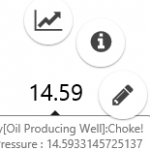
IFS OI Server provides the following functions for converting a time (in seconds since 1970 UTC) into a requested component value: Second, Minute, Hour, Day, Weekday, Month, Year.
Read more

Use the months of year functions (e.g. January()) to get the time of the start of the month.
Read more

Use Format() to format the supplied time argument in a particular way.
Read more

Use NumberToString() to convert a number into a string.
Read more

Use MakeDateTime() to get a specified date/time as Unix epoch time.
Read more

Use StdDev_Sampled() to get the standard deviation of the values of an expression over a range of time
Read more

Use StdDev() to get the standard deviation of the supplied arguments
Read more

The Data Label displays a single value. It is one of the most useful of Explorer’s components, as it is used to show time-aware tag and attribute values on Explorer pages, with quick access to trending and point detail. The data label can also be used to display a column value from a relational dataset, an ad-hoc calculation, or a plain value. This article describes how to configure a data label, and applies to versions 4.4 and later of P2 Explorer.
Read more

Use CatchLowConfidence() to get a default value if the confidence of the supplied expression is too low.
Read more

Use CatchNoSamples() to get a default value if an error occurs in the supplied argument, or if there are no data samples present.
Read more









